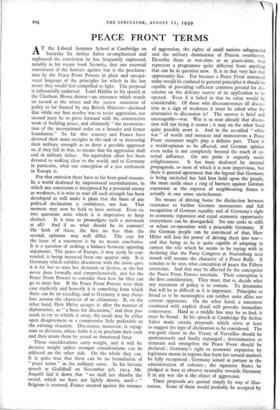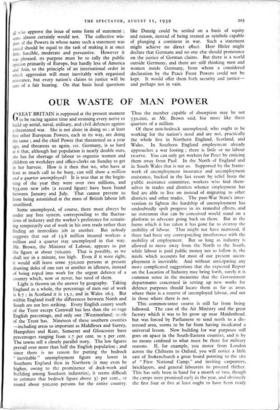PEACE FRONT TERMS
T the Liberal Summer School at Cambridge on Saturday Sir Arthur Salter re-emphasised and rephrased the conviction he has frequently expressed, notably in his recent book Security, that one essential constituent of the barriers against war is the proclama- tion by the Peace Front Powers in plain and unequi- vocal language of the principles for which in the last resort they would feel compelled to fight. The proposal is influentially endorsed. Lord Halifax in his speech at the Chatham House dinner—an utterance which stands on record as the wisest and the justest statement of policy so far framed by any British Minister—declared that while our first resolve was to resist aggression, our second must be to press forward with the constructive work of building peace, and ultimately "the reconstruc- tion of the international order on a broader and firmer foundation." So far this country and France have devoted their main energies to the task of so increasing their military strength as to deter a possible aggressor or, if they fail in that, to ensure that his aggression shall end in military defeat. No equivalent effort has been devoted to making clear to the world, and to Germany in particular, what our conception of a just settlement in Europe is.
For that omission there have so far been good reasons. In a world deafened by impassioned recriminations, in which any concession is interpreted by a potential enemy as weakness, it is wise to wait till such strength has been developed as will make it plain that the basis of any political declaration is confidence, not fear. That moment may now be held to have arrived. Even so, two questions arise which it is imperative to keep distinct. Is it wise to promulgate such a statement at all? And if so, what should be its content? On both of these, the first no less than the second, opinions may well differ. The case for the issue of a statement is by no means conclusive. It is a question of striking a balance between opposing arguments. The peace of Europe, it may justly be con- tended, is being menaced from one quarter only. It is Germany which exhibits discontent with the status quo; it is for her to state her demands or desires, as she has never done formally and comprehensively, and for the Peace Front Powers to consider then how far they can go to meet her. If the Peace Front Powers state their case explicitly and honestly it is something from which there can be no receding, and to Germany it may there- fore assume the character of an ultimatum. If, on the other hand, Herr Hitler accepts it, after the manner of diplomatists, as "a basis for discussion," and then pro- ceeds to try to whittle it away, the result may be either open disagreement or a compromise little preferable to the existing situation. Discussion, moreover, is repug- nant to dictators, whose habit it is to proclaim their ends and then attain them by actual or threatened force.
Those considerations carry weight, and it will be decisive weight unless stronger considerations can be adduced on the other side. On the whole they can. It is quite true that there can be no formulation of "peace terms" in the ordinary sense. In his historic speech at Guildhall on November 9th, 1914, Mr. Asquith laid it down that "we shall not sheathe the sword, which we have not lightly drawn, until—" Belgium is restored, France secured against the menace of aggression, the rights of small nations safeguarded and the military domination of Prussia overthrown. Describe those as war-aims or as peace-aims, they represent a programme quite different from anything that can be in question now. It is in that very fact that opportunity lies. For because a Peace Front statement today would be confined to general principles it should be capable of providing sufficient common ground for dis- cussion on the delicate matter of its application to be opened. Even if it failed in that its value would be considerable. Of those who discountenance all discus- sion as a sign of weakness it must be asked what the alternative to discussion is? The answer is brief and unescapable—war. War is so near already that discus- sion will not bring it nearer ; it may on the other hand quite possibly avert it. And in the so-called "white war" of words and menaces and manoeuvres a Peace Front statement might play a definite part. There is a world-opinion to be affected, and German opinion even today is not completely beyond the reach of ex- ternal influence. On one point it urgently needs enlightenment. It has been deafened by internal propaganda, to most of which it is now impervious, but there is general agreement that the legend that Germany is being encircled has laid firm hold upon the people, the more easily since a ring of barriers against German expansion at the expense of neighbouring States is actually in one sense encirclement.
No means of driving home the distinction between resistance to further German annexations and full recognition of German equality and of Germany's right to economic expansion and equal economic opportunity everywhere can be disregarded. No one seeks to stifle or refuse co-operation with a peaceable Germany. If the German people can be convinced of that, Herr Hitler will lose his power of driving them into war— and that being so he is quite capable of adopting in earnest the role which he seems to be toying with in declaring that the Party Congress at Nuremberg next month will assume the character of a Peace Rally. It remains to be seen what conception of peace the Führer entertains. And that may be affected by the conception the Peace Front Powers entertain. Their conception is the first consideration. They must, that is, decide what any statement of policy is to contain. To determine that will be as difficult as it is important. Principles so broad as to be meaningless can neither unite allies nor convert opponents. On the other hand, a statement cumbered with explicit detail will provoke immediate controversy. Hard as a middle line may be to find, it must be found. In his speech at Cambridge Sir Arthur Salter made certain proposals which serve at least to suggest the type of declaration to be considered. The war-guilt clause in the Treaty of Versailles should be spontaneously and finally expunged ; determination to maintain and strengthen the Peace Front should be declared ; Germany's right to economic expansion by legitimate means in regions that form her natural markets be fully recognised ; Germany joined as partner in the administration of colonies ; the signatory States be pledged at least to observe neutrality towards Germany if in any war she is the object of aggression.
These proposals are quoted simply by way of illus- tration. Some of them would probably be accepted by all who approve the issue of some form of statement ; some almost certainly would not. The collective wis- dom of the Powers in whose name such a statement was issued should be equal to the task of making it at once firm, forcible, moderate and persuasive. However it was phrased, its purpose must be to rally the public opinion primarily of Europe, but hardly less of America and Asia, to the principle of an international order in which aggression will meet inevitably with organised resistance, but every nation's claims to justice will be sure of a fair hearing. On that basis local questions like Danzig could be settled on a basis of equity and reason, instead of being treated as symbols capable of plunging a continent in war. Such a statement might achieve no direct effect. Herr Hitler might declare that Germans and no one else should pronounce on the justice of German claims. But there is a world outside Germany, and there are still thinking men and women inside Germany, from whom a considered declaration by the Peace Front Powers could not be kept. It would offer them both security and justice— and perhaps not in vain.









































 Previous page
Previous page